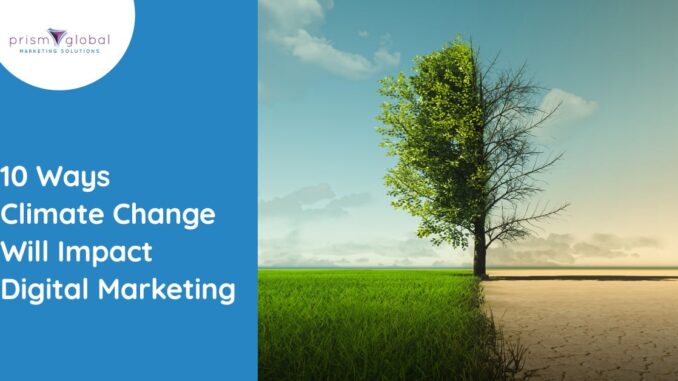
In the evolving landscape of global challenges, climate change stands out as a dominant force. As glaciers melt, sea levels rise, and weather patterns become more unpredictable, its ripple effects touch all facets of society, economy, and lifestyle. Remarkably, the implications of climate change extend even into the digital marketing space. Recently, while at a Columbia Business School Chief Marketing Officer program in New York City, I attended a session on climate change and its role in business. This got me thinking about the implications specifically for digital marketing. Let’s dive into the ways that digital marketing strategies, consumer behavior, and brand image are all influenced by the unfolding climate crisis. 1. The Rise of “Eco-Conscious” Consumers The modern consumer is more informed and discerning. With easy access to information, a significant segment is concerned about the environment and wants their purchasing habits to reflect this ethos. Brands are not only judged by the quality of their products or services but also by their environmental impact and sustainability efforts. It has become paramount for brands to communicate their sustainability initiatives effectively. Digital marketing strategies must highlight these eco-friendly efforts, using platforms like social media, email marketing, and online advertising. 2. Shift in Content Trends Natural disasters exacerbated by climate change, such as hurricanes, wildfires, or droughts, always dominate news cycles. This can influence the content trends and themes that resonate with audiences. It’s critical to think about your content and the timing of the promotion of your content to make sure you’re thoughtful about how and what you are promoting at any given time. Marketers must be agile, adjusting their content to be sensitive to global events. This might mean pausing specific campaigns or pivoting messaging to align with current events and sentiments. 3. Sustainable Digital Practices The digital realm itself is not exempt from environmental considerations. For instance, large data centers consume significant amounts of energy. Many companies genuinely practicing Corporate Social Responsibility will dig much deeper to do business with companies with this in mind a plan for the near and long-term future. Brands might consider ‘green hosting’ or other sustainable digital practices. This minimizes their carbon footprint and serves as a selling point for eco-conscious consumers. 4. Product and Service Evolution As the effects of climate change become increasingly evident, there’s a growing demand for products and services that combat or adapt to these challenges. If you have a product that does this, it’s essential to showcase that in your marketing efforts. Ensure your consumers know how your product will help with this growing concern. If your product or service does not solve this challenge, see if you can evolve your product line at all or adapt your current product to at least be more sustainable. This also creates opportunities for brands to develop and market innovative solutions. Whether it’s sustainable fashion, renewable energy solutions, or eco-friendly travel options, digital marketing campaigns must highlight these innovations. 5. Enhanced Corporate Social Responsibility (CSR) Brands are increasingly taking up the mantle of responsibility, engaging in CSR activities that contribute to environmental sustainability. A CSR program is not a one-time initiative. Think about how your company can grow and expand its CSR efforts, marketing them externally and internally so your employees and team members are equally a part of your company’s CSR plan. You also need to consider how you can showcase your CSR in your marketing campaigns. This boosts your brand’s image while growing trust among your consumers. 6. Enhanced Geo-Targeting Areas heavily impacted by climate change might experience shifts in consumer behavior. For instance, regions experiencing heatwaves might see a surge in demand for cooling products. Consider how you can geo-target your marketing campaigns to help solve these specific challenges in specific regions. 7. Evolving Influencer Collaborations Influencers who champion environmental causes have gained substantial traction. Their authenticity when discussing climate-related topics resonates with audiences. Brands can collaborate with eco-activists or green influencers to enhance credibility and reach an engaged audience. This will help align your brand with thought leaders incorporating climate change as part of their overall content strategy. 8. Crisis Management and PR Given the volatile nature of climate-induced events, brands need to be prepared for unforeseen PR challenges, whether a supply chain disruption due to extreme weather or a product suddenly deemed unsustainable. Digital marketers should have crisis management strategies in place. Quick, transparent, and empathetic communication can mitigate potential damage to your reputation. 9. Regulatory Considerations With the climate crisis intensifying, governments worldwide are introducing stricter regulations to promote sustainability. Brands must stay informed about these changes, ensuring their digital marketing campaigns remain compliant and effectively communicate their adherence to such regulations. Work with your internal regulatory department to make sure your marketing is compliant. 10. Value-Driven Storytelling Stories that resonate are those that tap into core human values. The climate change narrative revolves around the collective good. Marketing campaigns that tell a compelling, value-driven story, emphasizing a brand’s commitment to a sustainable future, are more likely to engage and convert. The intricate relationship between climate change and digital marketing underscores the importance of global events on industry practices. While the challenges posed by climate change are daunting, they also present opportunities for innovation, growth, and forging deeper connections with audiences. As the digital landscape continues to evolve against the backdrop of the climate crisis, brands and marketers that demonstrate agility, empathy, and responsibility will emerge as leaders in their domain. Need help getting started? We invite you to schedule an inbound marketing consultation where we can discuss your current digital marketing initiatives to make sure they’re a success.

Leave a Reply